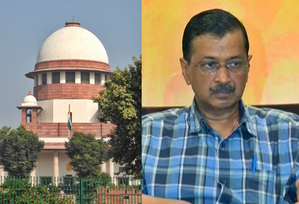The Supreme Court on Friday granted bail to Delhi Chief Minister Arvind Kejriwal in connection with the corruption case lodged by the Central Bureau of Investigation (CBI) linked to the alleged liquor policy scam, paving the way for his release as he has already secured bail in the ED case. However, it imposed several conditions.
Here are 10 key takeaways from the SC order, delivered by a division bench of Justices Surya Kant and Ujjal Bhuyan.
1. While out on bail, Kejriwal will not visit the Chief Minister's Office and the Delhi Secretariat.
2. He will not sign official files unless it is required and necessary for obtaining clearance/approval of the Lt Governor(L-G).
3. Kejriwal will not make any public comments on the merits of the case, as it is sub judice before the trial court.
4. He will not interact with any of the witnesses or have access to any official files connected with the case.
5. Kejriwal will remain present before the trial court on each and every date of the hearing, unless granted exemption.
6. The AAP supremo will fully cooperate with the trial court for expeditious conclusion of the trial proceedings.
7. Dismissing Kejriwal’s plea challenging the legality of his arrest, Justice Surya Kant did not find any merit in his contention that the CBI failed to comply with Section 41A CrPC, in its true letter and spirit. Section 41A of the CrPC pertains to the issuance of a notice by a police officer to an individual when their arrest is not warranted, but their presence is still required before the investigating authority.
8. In his opinion, Justice Surya Kant, who headed the bench, said that CBI followed the procedure which is contemplated in terms of the intent and purpose of Section 41A CrPC.
9. Further, Justice Kant said that the trial court’s approval of the CBI’s application to interrogate Kejriwal should be viewed as satisfying the essential requirements of Section 41A CrPC, adding that his arrest by the CBI was entirely permissible.
10. In a separate judgement, Justice Bhuyan did pose some questions about the timing and necessity of Kejriwal's arrest by the CBI.
Earlier in the day, the Rouse Avenue Court accepted the bail bonds furnished on behalf of Kejriwal and issued an order to release him from Tihar Jail.
--IANS
